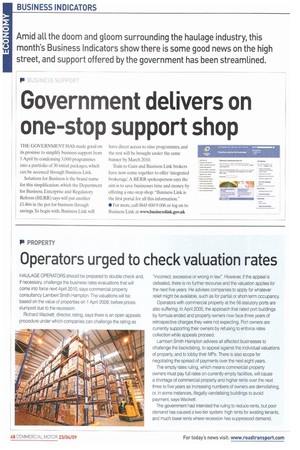P PROPERTY
Page 48

If you've noticed an error in this article please click here to report it so we can fix it.
Operators urged to check valuation rates
HAULAGE OPERATORS should be prepared to double check and, if necessary, challenge the business rates evaluations that will come into force next April 2010, says commercial property consultancy Lambert Smith Hampton. The valuations will be based on the value of properties on 1 April 2008, before prices slumped due to the recession.
Richard Wackett, director, rating, says there is an open appeals procedure under which companies can challenge the rating as
"incorrect, excessive or wrong in law". However, if the appeal is defeated, there is no further recourse and the valuation applies for the next five years. He advises companies to apply for whatever relief might be available, such as for partial or short-term occupancy.
Operators with commercial property at the 56 statutory ports are also suffering. In April 2005, the approach that rated port buildings by formula ended and property owners now face three years of retrospective charges they were not expecting. Port owners are currently supporting their owners by refusing to enforce rates collection while appeals proceed.
Lambert Smith Hampton advises all affected businesses to challenge the backdating, to appeal against the individual valuations of property, and to lobby their MPs. There is also scope for negotiating the spread of payments over the next eight years.
The empty rates ruling, which means commercial property owners must pay full rates on currently empty facilities, will cause a shortage of commercial property and higher rents over the next three to five years as increasing numbers of owners are demolishing, or, in some instances, illegally vandalising buildings to avoid payment, says Wackett.
The government had intended the ruling to reduce rents, but pox demand has caused a two-tier system: high rents for existing tenants, and much lower rents where recession has suppressed demand.
















































































































































